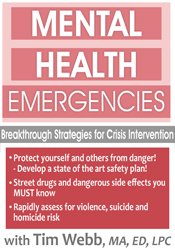

In November, 2014 a 68-year old male was hospitalized near Minneapolis because he was suffering from paranoia and episodes of confusion. Hours later, the man assaulted multiple nurses when he chased them out of their station, furiously swinging a metal pole. One nurse suffered a collapsed lung and another fractured her wrist, along with bruises and cuts. The man then fled the hospital and ran for blocks until police could finally take him down.
As a clinician, you will inevitably be faced with moments of crisis.
Preparing for the worst is vital to the safety of your client, yourself and others in the community. What would you have done in that scenario? In hindsight, were there warning signs hospital workers missed during intake?
As an in-take director for an inpatient psychiatric treatment center and over 20 years’ experience, Tim Webb, MAEd, LPC, will teach you the skills you need to quickly assess, triage, manage and treat clients in crisis.
Leave this seminar with new confidence that you can:
| File type | File name | Number of pages | |
|---|---|---|---|
| Webcast Manual (0.77 MB) | 30 Pages | Available after Purchase |

Tim Webb, M.A.Ed., LPC is the founder and CEO of The FOCUS Group, PLLC, a Clemmons, North Carolina based clinical training and consultation agency specializing in developing comprehensive programs for mental health crisis management. FOCUS Group helps systems ensure clinician safety; improve treatment of trauma and sexual aggression, performance enhancement and manage facility growth. His professional experiences include intake director and managing crisis services in the community, clinics and emergency rooms. As a clinical director, he has been responsible for program development, hiring/supervising clinicians and direct care staff, and all clinical operations for residential facilities. His unique combination of clinical and management experiences allow him to understand both the needs of administrative and front-line staff as he speaks to professionals in various settings.
In addition to holding Masters in Counseling from Wake Forest, Mr. Webb is a 2nd degree black belt in Mu Duk Kwan and an instructor in that martial art. He has provided clinical services in a number of jail settings and also has a background in firefighting. Mr. Webb’s unique combination of martial arts, teaching, emergency services and clinical experience have allowed him to develop the Stay Safe system of managing physically aggressive clients in a non-violent but safe and effective system.
Speaker Disclosures:
Financial: Tim Webb is the Founder/CEO and author for The FOCUS Group, PLLC. He has an employment relationship with Daymark Recovery Services. He receives a speaking honorarium from PESI, Inc. Tim has no relevant financial relationships with ineligible organizations.
Non-financial: Tim Webb has no relevant non-financial relationship to disclose.
Ethical Responsibilities and Legal Obligations in Emergency Situations
Mental Status Exams
Suicide Risk Assessment
Violent or Homicidal: Assessment & Intervention
Danger in the Chemically Dependent: Alcohol, Street Drugs & Prescriptions
Please wait ...